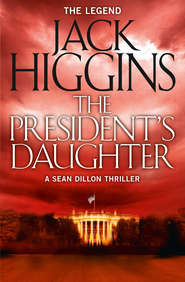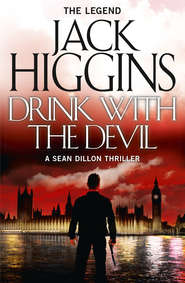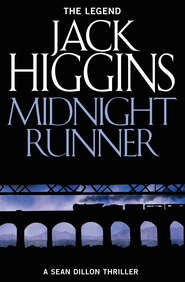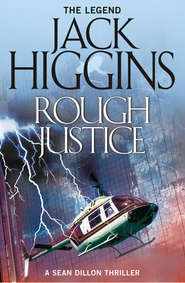По всем вопросам обращайтесь на: info@litportal.ru
(©) 2003-2024.
✖
Confessional
Автор
Год написания книги
2018
Настройки чтения
Размер шрифта
Высота строк
Поля
He swung round in a wide loop and called to Salim. ‘The helicopters. Try for the fuel tanks.’
There was the sound of an alarm klaxon from the main administration block now, voices crying in the night and shooting started. Salim raked the two helicopters with a continuous burst and the fuel tank on the one on the left exploded, a ball of fire mushrooming into the night, burning debris cascading everywhere. A moment later, the second helicopter exploded against the MIG next to it and that also started to burn.
‘That’s it!’ Villiers said. ‘They’ll all go now. Let’s get out of here.’
As he spun the wheel, Salim swung the machine gun, driving back the soldiers running towards them. Villiers was aware of Kirov standing as the men went down on the other side of the tarmac, firing his pistol deliberately in a gallant, but futile gesture. And then they were climbing up the slope of the dunes, tracks churning sand and entering the mouth of the wadi. The dried bed of the old stream was rough with boulders here and there, but visibility in the moonlight was good. Villiers kept his foot down and drove fast.
He called to Levin. ‘You okay?’
‘I think so,’ the old Russian told him. ‘I’ll keep checking.’
Salim patted the Degtyarev machine gun. ‘What a darling. Better than any woman. This, I keep, Villiers Sahib.’
‘You’ve earned it,’ Villiers told him. ‘Now all we have to do is pick up Hamid and drive like hell for the border.’
‘No helicopters to chase us,’ Levin shouted.
‘Exactly.’
Salim said, ‘You deserve to be Rashid, Villiers Sahib. I have not enjoyed myself so much in many years.’ He raised an arm. ‘I have held them in the hollow of my hand and they are as dust.’
‘The Koran again?’ Villiers asked.
‘No, my friend,’ Salim bin al Kaman told him. ‘It is from your own Bible this time. The Old Testament,’ and he laughed out loud exultantly as they emerged from the wadi and started down to the plain below where Hamid waited.
2 (#ulink_4683d8f7-e237-5bdf-a636-dab026aab9fc)
D15, that branch of the British Secret Intelligence Service which concerns itself with counter-espionage and the activities of secret agents and subversion within the United Kingdom, does not officially exist, although its offices are to be found in a large white and red brick building not far from the Hilton Hotel in London. D15 can only carry out an investigation and has no powers of arrest. It is the officers of the Special Branch at Scotland Yard who handle that end of things.
But the growth of international terrorism and its effects in Britain, particularly because of the Irish problem, were more than even Scotland Yard could handle and in 1972, the Director General of D15, with the support of 10 Downing Street, created a section known as Group Four with powers held directly from the Prime Minister of the day to co-ordinate the handling of all cases of terrorism and subversion.
After ten years, Brigadier Charles Ferguson was still in charge. A large, deceptively kindly-looking man, the Guards tie was the only hint of a military background. The crumpled grey suits he favoured, and half-moon reading glasses, combined with untidy grey hair to give him the look of some minor academic in a provincial university.
Although he had an office at the Directorate General, he preferred to work from his flat in Cavendish Square. His second daughter, Ellie, who was in interior design, had done the place over for him. The Adam fireplace was real and so was the fire. Ferguson was a fire person. The rest of the room was also Georgian and everything matched to perfection, including the heavy curtains.
The door opened and his manservant, an ex-Gurkha naik named Kim, came in with a silver tray which he placed by the fire. ‘Ah, tea,’ Ferguson said. ‘Tell Captain Fox to join me.’
He poured tea into one of the china cups and picked up The Times. The news from the Falklands was not bad. British forces had landed on Pebble Island and destroyed eleven Argentine aircraft plus an ammo dump. Two Sea Harriers had bombed merchant shipping in Falkland Sound.
The green baize door leading to the study opened and Fox came in. He was an elegant man in a blue flannel suit by Huntsman of Savile Row. He also wore a Guards tie, for he had once been an acting captain in the Blues and Royals until an unfortunate incident with a bomb in Belfast during his third tour of duty had deprived him of his left hand. He now wore a rather clever replica which, thanks to the miracle of the microchip, served him almost as well as the original. The neat leather glove made it difficult to tell the difference.
‘Tea, Harry?’
‘Thank you, sir. I see they’ve got the Pebble Island story.’
‘Yes, all very colourful and dashing,’ Ferguson said as he filled a cup for him. ‘But frankly, as no one knows better than you, we’ve got enough on our plate without the Falklands. I mean, Ireland’s not going to go away and then there’s the Pope’s visit. Due on the twenty-eighth. That only gives us eleven days. And he makes such a target of himself. You’d think he’d be more careful after the Rome attempt on his life.’
‘Not that kind of man, is he, sir?’ Fox sipped some of his tea. ‘On the other hand, the way things are going, perhaps he won’t come at all. The South American connection is of primary importance to the Catholic Church and they see us as the villain of the piece in this Falklands business. They don’t want him to come and the speech he made in Rome yesterday seemed to hint that he wouldn’t.’
‘I’ll be perfectly happy with that,’ Ferguson said. ‘It would relieve me of the responsibility of making sure some madman or other doesn’t try to shoot him while he’s in England. On the other hand, several million British Catholics would be bitterly disappointed.’
‘I understand the Archbishops of Liverpool and Glasgow have flown off to the Vatican today to try to persuade him to change his mind,’ Fox said.
‘Yes, well let’s hope they fail miserably.’
The bleeper sounded on the red telephone on Ferguson’s desk, the phone reserved for top security rated traffic only.
‘See what that is, Harry.’
Fox lifted the receiver. ‘Fox here.’ He listened for a moment then turned, face grave and held out the phone. ‘Ulster, sir. Army headquarters Lisburn and it isn’t good!’
It had started that morning just before seven o’clock outside the village of Kilgannon some ten miles from Londonderry. Patrick Leary had delivered the post in the area for fifteen years now and his Royal Mail van was a familiar sight.
His routine was always the same. He reported for work at headquarters in Londonderry at five-thirty promptly, picked up the mail for the first delivery of the day, already sorted by the night staff, filled up his petrol tank at the transport pumps then set off for Kilgannon. And always at half past six he would pull into the track in the trees beside Kilgannon Bridge to read the morning paper, eat his breakfast sandwiches and have a cup of coffee from his thermos flask. It was a routine which, unfortunately for Leary, had not gone unnoticed.
Cuchulain watched him for ten minutes, waiting patiently for Leary to finish his sandwiches. Then the man got out, as he always did, and walked a little way into the wood. There was a slight sound behind him of a twig cracking under a foot. As he turned in alarm, Cuchulain slipped out of the trees.
He presented a formidable figure and Leary was immediately terrified. Cuchulain wore a dark anorak and a black balaclava helmet which left only his eyes, nose and mouth exposed. He carried a PPK semi-automatic pistol in his left hand with a Carswell silencer screwed to the end of the barrel.
‘Do as you’re told and you’ll live,’ Cuchulain said. His voice was soft with a Southern Irish accent.
‘Anything,’ Leary croaked. ‘I’ve got a family – please.’
‘Take off your cap and the raincoat and lay them down.’ Leary did as he was told and Cuchulain held out his right hand so that Leary saw the large white capsule nestling in the centre of the glove. ‘Now, swallow that like a good boy.’
‘Would you poison me?’ Leary was sweating now.
‘You’ll be out for approximately four hours, that’s all,’ Cuchulain reassured him. ‘Better that way.’ He raised the gun. ‘Better than this.’
Leary took the capsule, hand shaking, and swallowed it down. His legs seemed to turn to rubber, there was an air of unreality to everything, then a hand was on his shoulder pushing him down. The grass was cool against his face, then there was only the darkness.
Dr Hans Wolfgang Baum was a remarkable man. Born in Berlin in 1950, the son of a prominent industrialist, on his father’s death in 1970 he had inherited a fortune equivalent to ten million dollars and wide business interests. Many people in his position would have been content to live a life of pleasure, which Baum did, with the important distinction that he derived his pleasure from work.
He had a doctorate in engineering science from the University of Berlin, a law degree from the London School of Economics, and a master’s degree in business administration from Harvard. And he had put them all to good use, expanding and developing his various factories in West Germany, France and the United States, so that his personal fortune was now estimated to be in excess of one hundred million dollars.
And yet the project closest to his heart was the develop ment of the plant to manufacture tractors and general agricultural machinery outside Londonderry near Kilgannon. Baum Industries could have gone elsewhere, indeed the members of the board of management had wanted to. Unfortunately for them and the demands of sound business sense, Baum was a truly good man, a rare commodity in this world, and a committed Christian. A member of the German Lutheran Church, he had done everything possible to make the factory a genuine partnership between Catholic and Protestant. He and his wife were totally committed to the local community, his three children attended local schools.
It was an open secret that he had met the Provisional IRA, some said the legendary Martin McGuiness himself. Whether true or not, the PIRA had left the Kilgannon factory alone to prosper, as it had done, and to provide work for more than a thousand Protestants and Catholics previously unemployed.
Baum liked to keep in shape. Each morning, he awakened at exactly the same time, six o’clock, slid out of bed without disturbing his wife, and pulled on track suit and running shoes. Eileen Docherty, the young maid, was already up and making tea in the kitchen although still in her dressing gown.
‘Breakfast at seven, Eileen,’ he called. ‘My usual. Must get an early start this morning. I’ve a meeting in Derry at eight-thirty with the Works Committee.’
He let himself out of the kitchen door, ran across the parkland, vaulted a low fence and turned into the woods. He ran rather than jogged at a fast, almost professional pace, following a series of paths, his mind full of the day’s planned events.
By six forty-five he had completed his schedule, turned out of the trees and hammered along the grass verge of the main road towards the house. As usual, he met Pat Leary’s mail van coming along the road towards him. It pulled in and waited and he could see Leary through the windscreen in uniform cap and coat sorting a bundle of mail.
Baum leaned down to the open window. ‘What have you got for me this morning, Patrick?’











